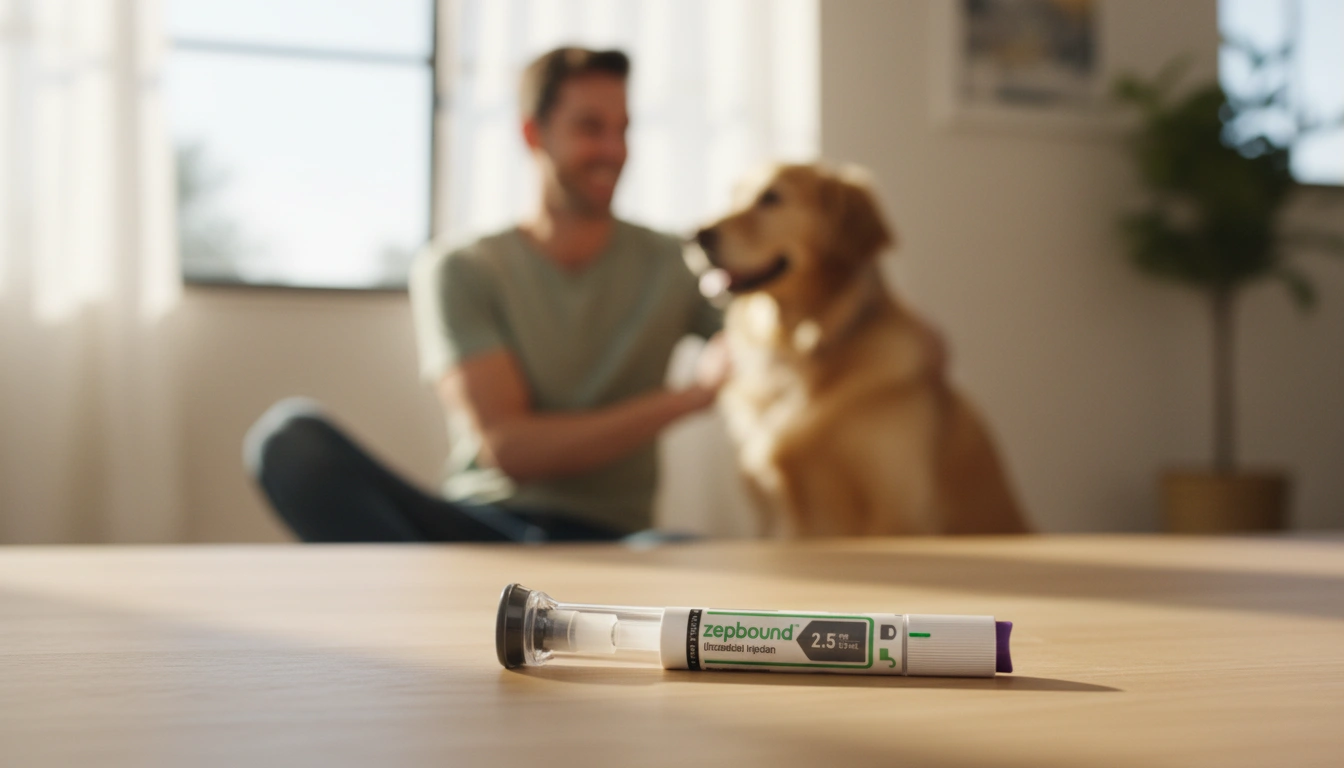Can You Gain Weight on Zepbound? Understanding the Complexities of Weight Management

Have you ever felt the frustration of gaining weight despite your best efforts? It’s a common concern, especially for those embarking on a weight loss journey with medications like Zepbound (tirzepatide). With the rise of these medications, questions about their effectiveness and potential side effects have become increasingly pertinent. One of the most pressing questions we often hear is: Can you gain weight on Zepbound? This inquiry not only reflects a desire for clarity but also highlights the complexities of weight management.
As we dive into this topic, we aim to equip you with a comprehensive understanding of Zepbound, how it works, and the factors influencing weight loss outcomes while on the medication. By the end of this post, you’ll have a clearer picture of how to navigate your weight loss journey, whether you’re considering Zepbound or are already on it.
Introduction
Weight management is a multifaceted issue that affects millions of people. According to the World Health Organization, obesity has nearly tripled since 1975, making it a significant public health challenge. Medications like Zepbound have emerged as innovative tools for weight management, promising significant weight loss for many. However, the reality is that not everyone experiences the same results, leading to questions about the medication's efficacy and potential for weight gain.
At TrimRx, our mission is to provide personalized, medically supervised weight loss solutions that prioritize safety, transparency, and individual care. We understand that embarking on a weight loss journey can be daunting, especially when faced with uncertainties about the effectiveness of treatments. In this blog post, we will explore the mechanisms of Zepbound, potential reasons for weight gain while using it, and strategies to optimize your weight loss journey.
We’ll also discuss the importance of a holistic approach to weight management that includes healthy eating, physical activity, and mental well-being. By the end of this article, we hope to empower you with the knowledge to make informed decisions about your weight loss journey.
What Is Zepbound?
Zepbound, also known as tirzepatide, is a glucagon-like peptide-1 (GLP-1) receptor agonist that has recently gained FDA approval for chronic weight management in adults. This medication works by mimicking the action of natural hormones in the body that regulate appetite and glucose metabolism. Specifically, Zepbound targets both GLP-1 and glucose-dependent insulinotropic polypeptide (GIP) receptors, enhancing feelings of fullness, reducing appetite, and promoting better blood sugar control.
How Does Zepbound Work?
Zepbound’s unique mechanism of action involves:
- Reducing Appetite: By activating GLP-1 and GIP receptors, Zepbound helps decrease hunger signals, making it easier to consume fewer calories without feeling deprived.
- Increasing Satiety: This medication prolongs the feeling of fullness after meals, which can lead to reduced caloric intake over time.
- Improving Metabolic Health: Zepbound also helps regulate blood sugar levels, which is crucial for individuals with insulin resistance or type 2 diabetes.
Clinical trials have shown that individuals taking Zepbound can lose an average of 15-20% of their body weight over approximately 72 weeks, especially when combined with a reduced-calorie diet and increased physical activity. However, these results can vary based on individual factors, including adherence to the treatment plan, lifestyle choices, and metabolic differences.
The Role of Personalized Care
At TrimRx, we prioritize a personalized approach to weight management. Our programs are designed to meet the unique needs of each individual, combining medications like Zepbound with comprehensive support that includes physician consultations, lab work, and ongoing coaching. If you’re interested in exploring if Zepbound is right for you, we encourage you to take our free assessment quiz here.
Can You Gain Weight on Zepbound?
While Zepbound can be effective for many, it’s essential to understand that weight loss is not guaranteed for everyone. There are several reasons why individuals might experience weight gain while using Zepbound. Let’s explore these factors in detail.
1. Caloric Intake and Food Choices
Even though Zepbound helps reduce appetite, it doesn’t eliminate the importance of making healthy food choices. If individuals consume high-calorie, processed foods or do not adhere to a balanced diet, they may still gain weight despite taking the medication. Nutrition plays a crucial role in weight management, and it’s essential to focus on nutrient-dense foods that support overall health.
2. Medication Dosage
Zepbound is typically prescribed starting at a lower dose, which may limit its immediate effects on appetite and weight loss. As the dosage is gradually increased, many individuals begin to see improved results. If someone is not experiencing significant weight loss, they may be on a dose that is too low for their needs. It’s crucial to have open communication with your healthcare provider about adjusting the dosage to ensure optimal results.
3. Physical Activity Levels
Exercise is a vital component of any weight loss strategy. While Zepbound can aid in reducing appetite, incorporating regular physical activity can enhance its efficacy. A sedentary lifestyle may hinder weight loss progress, leading to potential weight gain. Engaging in regular exercise not only helps burn calories but also promotes muscle retention, which is beneficial for metabolism.
4. Hormonal Influences and Medical Conditions
Hormones play a significant role in weight management. Conditions such as hypothyroidism, polycystic ovary syndrome (PCOS), and other hormonal imbalances can interfere with weight loss efforts. Additionally, certain medications for unrelated health issues may contribute to weight gain or impede weight loss. If you suspect that a medical condition is affecting your progress, it’s essential to discuss this with your healthcare provider.
5. Psychological Factors
Weight management is not solely a physical endeavor; psychological factors also play a crucial role. Stress, anxiety, and emotional eating can all contribute to weight regain, even when using Zepbound. Addressing mental health alongside physical health is vital for sustainable weight management. Techniques such as mindfulness, therapy, or stress-reduction strategies can be beneficial.
6. Natural Weight Loss Plateaus
Weight loss is rarely linear; it often involves periods of rapid loss followed by plateaus where weight stabilizes or even slightly increases. This phenomenon can be discouraging but is a normal part of the weight loss journey. Understanding that plateaus are common can help individuals remain motivated and continue their efforts.
Summary of Factors
In summary, while Zepbound can be an effective tool for weight management, various factors can influence its success. Understanding these factors can help individuals make informed decisions and adjust their strategies accordingly. If you find yourself struggling with weight gain while on Zepbound, consider seeking support from a registered dietitian or a weight loss specialist who can provide personalized guidance.
Optimizing Your Weight Loss Journey with Zepbound
To maximize the benefits of Zepbound and minimize the risk of weight gain, we recommend adopting a holistic approach to weight management. Here are some actionable strategies to consider:
1. Balanced Nutrition
Focus on a balanced diet that includes:
- Lean Proteins: Foods like chicken, fish, beans, and legumes can promote satiety and support muscle maintenance.
- Fruits and Vegetables: Rich in vitamins, minerals, and fiber, these foods can help regulate appetite and provide essential nutrients.
- Whole Grains: Incorporate whole grains like brown rice, quinoa, and oats, which can help maintain energy levels and support digestive health.
- Healthy Fats: Include sources of healthy fats such as avocados, nuts, and olive oil, which can enhance satiety.
2. Regular Physical Activity
Aim for at least 150 minutes of moderate-intensity exercise each week, as recommended by the CDC. This can include activities like walking, cycling, swimming, or strength training. Regular exercise not only supports weight loss but also improves overall health and well-being.
3. Consistent Monitoring
Keep track of your progress and make adjustments as needed. Regularly monitoring your weight, dietary habits, and physical activity can help you stay accountable and identify any areas for improvement.
4. Addressing Emotional Well-Being
Consider incorporating mindfulness practices, therapy, or support groups to address emotional eating and stress management. Building a supportive network can provide encouragement and accountability.
5. Consultation and Support
If you’re unsure about your progress or are experiencing challenges, don’t hesitate to reach out to healthcare professionals. At TrimRx, we offer personalized consultations to help you navigate your weight loss journey effectively. Taking our free assessment quiz can be a great first step toward a tailored weight management plan here.
Conclusion
In conclusion, the question of whether you can gain weight on Zepbound is complex and multifaceted. While the medication can significantly aid in weight loss for many individuals, various factors, including diet, dosage, lifestyle choices, and psychological influences, can impact outcomes. By adopting a holistic approach that combines medication with healthy eating, regular exercise, and emotional support, you can optimize your weight loss journey.
At TrimRx, we believe in empowering individuals with the tools and knowledge necessary for achieving sustainable weight loss. If you’re considering Zepbound or are currently on it and facing challenges, we’re here to help. Explore our personalized weight loss solutions and take the first step toward a healthier you today.
FAQ
How long does it take to see weight loss results on Zepbound?
Most individuals start to notice changes in appetite and weight within 4 to 12 weeks of starting Zepbound. However, results can vary based on dosage and individual factors.
What should I do if I’m gaining weight on Zepbound?
If you’re experiencing weight gain while on Zepbound, consider evaluating your diet, physical activity level, and dosage. Consulting with a healthcare provider or a registered dietitian can help identify potential areas for improvement.
Can I stop taking Zepbound anytime?
It’s essential to consult your healthcare provider before making any changes to your medication regimen. Abruptly stopping Zepbound may lead to weight regain and other health complications.
What lifestyle changes should I make while on Zepbound?
Adopt a balanced diet rich in whole foods, engage in regular physical activity, and address emotional well-being. These lifestyle changes can enhance the effectiveness of Zepbound and support long-term weight management.
Where can I find support for my weight loss journey?
At TrimRx, we offer personalized assessments and consultations to help you navigate your weight loss journey effectively. Take our free assessment quiz here to get started.
By addressing these questions, we hope to clarify any uncertainties you may have and encourage you to take proactive steps in your weight loss journey. Remember, you’re not alone in this process, and support is available every step of the way.

Transforming Lives, One Step at a Time
Keep reading
Navigating Your Path: How Many Doses Are In Zepbound and What It Means for Your Health Journey
Curious how many doses are in Zepbound? Discover its weekly dosing schedule, available strengths, and titration process for effective weight loss. Learn more!
Navigating Your Zepbound Journey: Understanding Dosing and Expert Guidance
Wondering how to split doses of Zepbound? Learn why it’s unsafe & not recommended. Get expert guidance on Zepbound dosing for safe, effective weight loss with TrimRx. Click to learn more!
Understanding Zepbound Dosing: What is the Lowest Dose Available for Your Weight Loss Journey?
Curious what is the lowest dose of Zepbound available? Learn about Zepbound’s 2.5mg starting dose, titration, and safe use for weight loss. Get expert guidance!



